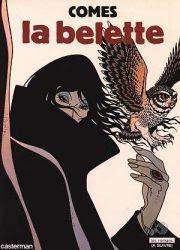 A cold and uncaring television producer, his psychologically disturbed and pregnant wife and their autistic son have moved to a small village in the Belgian rural Ardennes region, in the hope that the peace and quiet of rural life will have a beneficent effect on the boy's autism. But there is little peace to be had: the degenerate and superstitious villagers have no sense of privacy and intrude continually upon the family life, the fundamentalist catholic priest berates the couple for their lack of faith, toads and other unclean animals worm their way into the household, and one night their pet baby goat is beheaded, it's head nailed to the wooden door of their farmstead! The wife's dreams become stranger and stranger as slowly the mythical, shamanic powers of the Ardennes landscape are revealed...
A cold and uncaring television producer, his psychologically disturbed and pregnant wife and their autistic son have moved to a small village in the Belgian rural Ardennes region, in the hope that the peace and quiet of rural life will have a beneficent effect on the boy's autism. But there is little peace to be had: the degenerate and superstitious villagers have no sense of privacy and intrude continually upon the family life, the fundamentalist catholic priest berates the couple for their lack of faith, toads and other unclean animals worm their way into the household, and one night their pet baby goat is beheaded, it's head nailed to the wooden door of their farmstead! The wife's dreams become stranger and stranger as slowly the mythical, shamanic powers of the Ardennes landscape are revealed...Belgian comic artist and Ardennes native Didier Comes' classic 1983 graphic novel "La Belette" ("The Weasel") is a haunting tale in which city dwellers must confront and overcome their urbanoid fear of country people and enter a supernatural world of witchcraft and wiccan deities. Influenced by Belgian magical-realist novelists such as Michel De Ghelderode en Jean Ray (the author of Malpertuis), and narrated with a cinematic sense of beauty, the story Didier Comes tells is still gripping 24 (!) years after it was first published. Visually, the graphic novel is a treat: it is drawn in an magnificent chiaroscuro black and white that I utterly love. Didier Comes' oeuvre comes with the highest recommendations.
 "La Belette" points towards aspects of urbanoia, the city-dweller’s fear of the country-dwelling ‘other’, that Carol Clover missed out in her classic study of horror film, 'Man, women and chain saws'. The study focuses on American slasher flicks of the 1980s, and that focus has consequences for her analysis of urbanoia: aspects of that fear that are irrelevant to the concerns of that particular genre are overlooked. I'm referring to themes of superstition, witchcraft, sorcery and mythology, themes that are apparently more 'at home' in Old World than in American urbanoia.
"La Belette" points towards aspects of urbanoia, the city-dweller’s fear of the country-dwelling ‘other’, that Carol Clover missed out in her classic study of horror film, 'Man, women and chain saws'. The study focuses on American slasher flicks of the 1980s, and that focus has consequences for her analysis of urbanoia: aspects of that fear that are irrelevant to the concerns of that particular genre are overlooked. I'm referring to themes of superstition, witchcraft, sorcery and mythology, themes that are apparently more 'at home' in Old World than in American urbanoia.Like Belgian Black Metal band Lugubrum, Didier Comes appropriates the fears of urbanoia, harnessing the 'mystery' and 'wildness' projected onto rural areas by urban culture. Where Lugubrum uses the power of the scatological (Clover: "They do not observe the civilized rules of hygiene or personal habit..."), Didier Comes avails himself of the mystical powers which suburban wiccan witches and their urban academic predecessors have ascribed to country dwellers. To the magic of the Ardennes, Comes fuses another magic, the magic of primitivism.
The results are breath-taking.





No comments:
Post a Comment